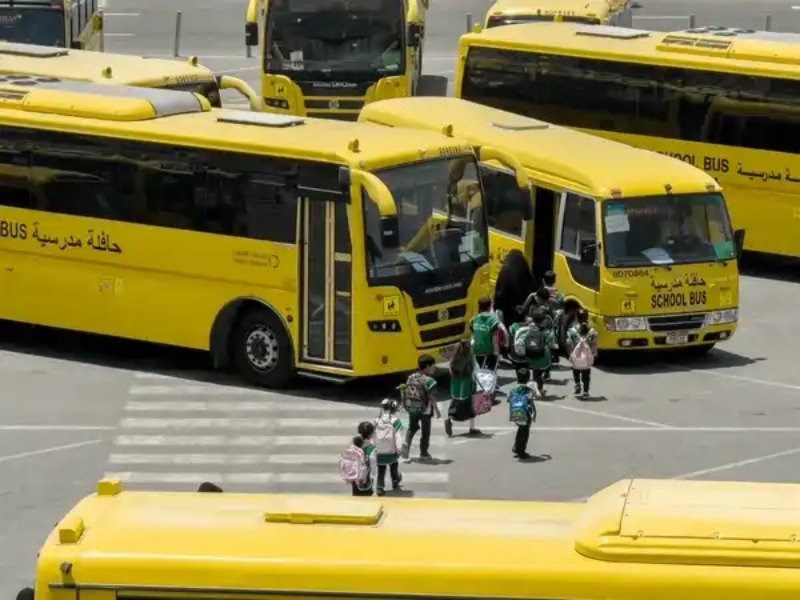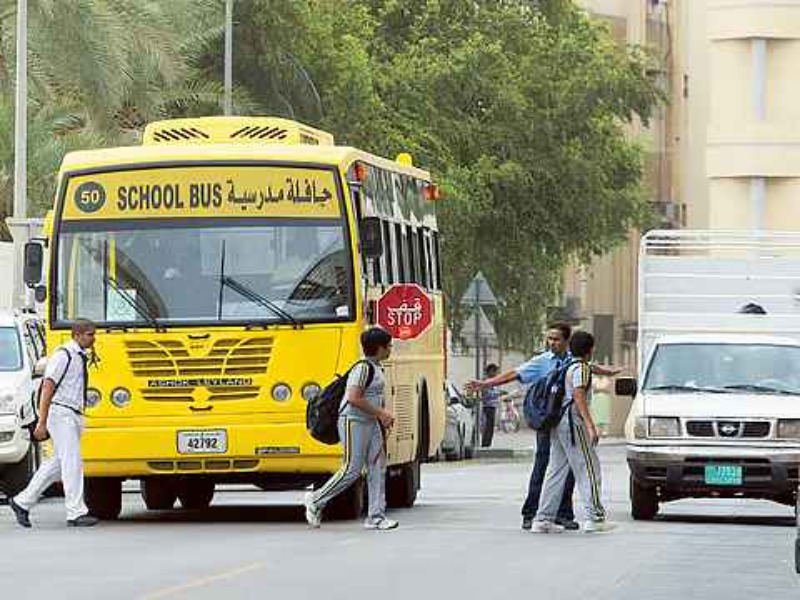Students, parents and schools around Abu Dhabi are preparing to adopt a new academic system that puts safety and well-being at the centre of everyday activities. The Department of Education and Knowledge (ADEK), in collaboration with the schools has come up with extensive policies on the use of school buses and food services with the aim of ensuring safety among the children against possible risks, besides ensuring they lead a healthy lifestyle.
The new regulations, which have been enforced since the 2024-2025 academic year, will be fully mandatory as the 2025-2026 academic year begins. Those institutions that do not do so will be vulnerable to punishment according to the provisions of the governing regulations of ADEK and the Federal Decree Law No. 31 of 2021.
Extensive School Bus Safety Framework
Prior to the kids going to school, they have to be all packed up with everything they need, along with a valid bus ID. They are asked to get to the bus stop at least five minutes before the time and to wait somewhere safe, not near the roads or traffic congestion. Parents have been encouraged to closely monitor young children in order to avoid accidents.
Boarding procedures involve ADEK notes that the students are advised to board only after the bus has fully stopped. They are supposed to hang on the handrails, get to their seats quickly, and wear seatbelts where possible. The supervisors must manage the procedure to be sure that no child will be left alone at the stop.
Regulations of onboard conduct have been enhanced. Students need to sit up all the time, not make sounds when not necessary, and not have bags and other obstructions in aisles. They must not lean out of the windows, throwing anything or touching with their hands safety devices like first aid kits and emergency exits. The purpose of such measures is to avoid the distraction of drivers and to be prepared in emergencies.

Arrival at School
When arriving on the school premises, the children are supposed to get off the bus in a peaceful manner and walk straight to classes, and not to congregate or loiter around. Schools are also told to create areas where children would be dropped off, and supervisors should ensure that they do not leave any child behind.
Dismissal and Return Trips
Students line up at pick-up areas at the end of the day. Supervisors assist younger children to board safely, and all students are required to observe the same rules of conduct as in the morning, like wearing seatbelts and avoiding disruptive behavior.
Guidelines on crossing Guidelines
Children below the age of 11 years are not allowed to cross roads without any supervision. They have to be helped at bus stops by their parents or guardians. Students of older age are told that they should cross the road after making sure that they have checked both ways and to walk at least ten steps before they can pick up some forgotten item.
A revised Food Policies Prohibit Unsafe Practice
Together with transport regulations, ADEK has established stringent provisions regarding food brought or eaten in school. As part of its healthy eating campaign, schools should outlaw unsafe foods, especially those foods that have nuts or other common allergens. Outsourced food has also not been allowed during school hours, like services like Talabat.
The policy recognizes six frameworks of sound nutrition that any school should maintain:
- Providing safe and healthy food choices
- Healthy eating in schools
- Meeting special nutrition requirements for children with allergies or prohibitions.
- Helping food be sustainable
- Adhering to the regulatory standards
- Being transparent and accountable
The policy has the sustainability aspect as well. Schools are advised to implement plant-based meals, use local suppliers, minimize packaging waste, and implement ways of disposal that are environmentally friendly. With the integration of student health and environmental responsibility, ADEK will be able to inculcate long-term habits in younger generations.
To ensure accountability, the schools need to post their food policies on their official websites, making them accessible to the staff, parents, and suppliers.
Legal Support and Responsibility
These actions are not only recommendations, but ADEK has established definite deadlines and compliance inspections. The underperforming schools are subject to legal prosecution under the Federal Decree Law No. 31 of 2021 that regulates the health and safety standards in all educational institutions.
With the implementation of an organized strategy integrating transportation safety and nutrition, the Abu Dhabi education system is expected to establish the standard of whole student wellbeing in the area.
A Healthier and safer learning environment
The officials of the educational system think that the emphasis on healthy eating and on safe traveling simultaneously is crucial. Tens of thousands of children are on the bus each day, and transportation safety is of great importance. Equally, school meals constitute a significant part of the daytime nutrition of a student, which predetermines his or her long-term health status.
Parents have embraced the transparency and responsibility in the new rules, although some of them have raised issues regarding the adaptation of routines. In the case of schools, the difficulty is to strike a balance between enforcement and education, educating the students about the reason why each rule was necessary.






